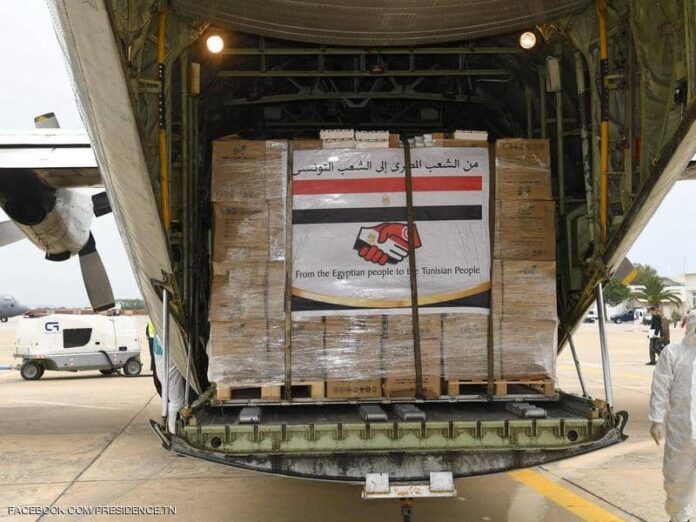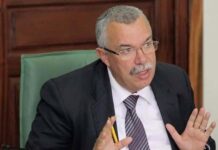The huge increase in Corona virus cases in Tunisia has incited other Arab countries to step in with supplies of vaccines and medical aid, as regional leaders flex their diplomatic muscle and try to “earn goodwill.”
Analysts said that although the response, which comes at a time when Tunisia’s health system is showing signs of collapse, reflects a rare degree of regional solidarity, it does allow some powers in the Middle East to show their capabilities.
“A proxy battle for the Arab world going on within the framework of vaccine diplomacy but also in the public arena of foreign aid in Tunisia,” said Sarah Yerkes, a member of the Carnegie Endowment for International Peace.
No country in the region has brought more vaccine doses than Saudi Arabia, which announced last week that it would send one million doses to Tunisia in addition to medical supplies.
The United Arab Emirates, which began manufacturing vaccines earlier this year, has sent 500,000 doses, and neighboring Algeria has sent aid, including 250,000 doses.
Turkey also intervened with 50,000 doses, and many other countries in the region, such as Egypt, Morocco and Qatar, also sent medical supplies including field hospitals.
The total pledged vaccine doses have not been announced, but they are likely to come from several manufacturers, depending on each donor country’s supply.
Vaccination is a Diplomatic Tool
Until recently, countries that developed their own vaccines – including China, Russia and the United States – were most able to easily use them as a diplomatic tool, “Now the problem is not the production of the vaccine, but the ability to buy it.
“Saudi Arabia is able to do that,” said Osama Helal, an independent Tunisian analyst, while Ilham Fakhro, a senior analyst, said it was “a kind of brag” for the Arab Gulf states at the International Crisis Group.
And she continued, “Now that Saudi Arabia has made progress in vaccinating its population, I think we can see that it is expanding its assistance to include more Corona diplomacy.”
Saudi Arabia is Polishing its Image Abroad
Youssef Al-Sharif, a political analyst and director of the Global Columbia Centers in Tunisia, said that the significant assistance provided by Saudi Arabia in the midst of the Tunisian crisis could also help the kingdom reshape its image abroad.
Saudi Arabia has come under sharp criticism in recent years following the murder of journalist Jamal Khashoggi at the hands of Saudi agents and its involvement in human casualties in the war in Yemen.
“Diplomatically, these massive amounts of the vaccine have suddenly made the Saudis and Emiratis very popular in Tunisia, and this is not always the case,” Sharif added, adding that it was too early to know what kind of long-term impact the vaccine donations would have on public opinion or relations with Tunisia, as he put it. Apart from that, he said, “It is a big step in improving the kingdom’s image abroad.”
It is noteworthy that Saudi Arabia sent doses to Tunisia, although most of its residents have not yet received two doses of the vaccine. Conversely, the UAE has fully vaccinated two-thirds of its population.
Promises of Other Doses
Tunisia has recorded one of the highest death rates in Africa, at a time when only 6 percent of the country’s population of 11 million people was fully vaccinated by mid-July.
Tunisia received promises of nearly 4 million doses of the vaccine by the beginning of next week, “thanks to international solidarity and the assistance of brotherly and friendly countries.
France and America on the Line
The dismissed Minister of Health, Faouzi Mehdi, told parliament, “Tunisia got vaccine doses from France, which was its former occupier, and it still has close relations with it.”
France has pledged to provide about 800,000 doses, in addition to more than 300,000 doses of AstraZeneca secured through the Covax system, an initiative supported by the World Health Organization.
A White House official confirmed that the United States will also provide 500,000 doses through Covax, as the World Bank approved $100 million in funding to support Tunisia’s efforts to obtain and manage vaccines, in March 2021.
Tunisia said earlier this month that it would buy 3.5 million doses directly from Johnson & Johnson. It also purchased some doses of the Pfizer vaccine.
Popular Solidarity
Tunisian analyst Mohamed Diaa Hammami said the country is witnessing a “complete solidarity movement” from across the region.
He added: “No Arab country has a significant strategic interest in Tunisia.”
It should be noted that the Ennahda party, which has the largest representation in Parliament and which supports the prime minister and forms the largest bloc in Parliament, has sought the support of Qatar and its ally, Turkey.
Meanwhile, anti-Islamist factions previously worked to block Qatari aid in other areas while Tunisia’s non-Islamist presidents were more willing to pursue support from Saudi Arabia, Qatar’s regional rival, which gave Tunisia a $500 million loan in 2019.
Failure to Manage the Crisis
In addition to facing common challenges in much of the developing world, including a weak health system and widespread hesitation about vaccines, the Tunisian government has “fundamentally failed to act effectively” in managing the crisis, says Sarah Yerkes.
Even as life is returning to normal in some parts of the world where vaccines are readily available, doctors in Tunisia have described the situation as a nightmare in recent weeks.
In this context, a 26-year-old doctor who works at Mongi Slim Hospital in the capital, Tunis, says that sometimes dozens of people were waiting in the emergency room, sitting on chairs they brought from their homes. At one point, the daughter of a patient reported to the doctor saying that she believed her father had died while lying down among several other patients.
The doctor, who spoke on condition of anonymity for fear of reprisals from health officials, added: “It is painful for patients but also for doctors as well.”
A 25-year-old doctor treating coronavirus patients at another hospital said his hospital had to turn some patients away this past weekend due to lack of oxygen and rationing of the supply among admitted patients. He expects the outbreak to get worse. Even with large donations of vaccines, he said, it will take time for residents to feel the impact.
In light of the country’s crisis and the collapse of medical systems, he points out, this has nothing to do with any political motives behind vaccine donations. “The source of vaccines is the least of our concerns,” he said.
Trans. BM jdd











